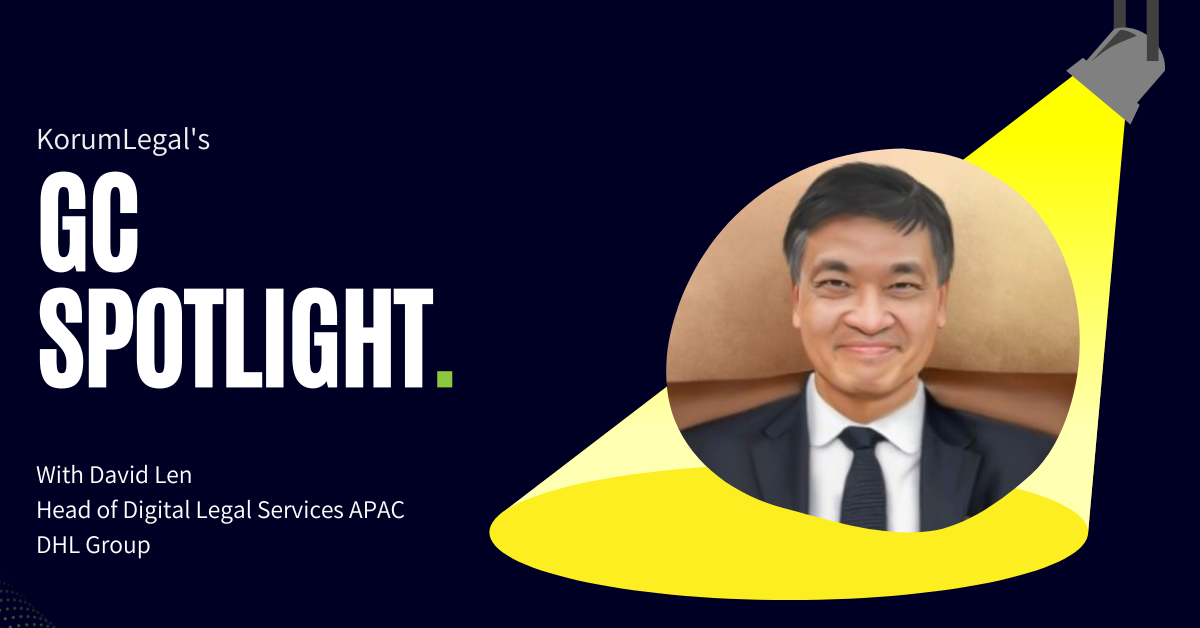GC Spotlight: David Len explores the future of digital law, AI governance, and tech-enabled legal teams.

Featured in our GC Spotlight Series this month is David Len, a technology lawyer with more than 28 years of professional experience in the legal fraternity, both in private practice and in-house. His core areas of expertise are in Technology, Digital, AI, Data, Privacy and Cybersecurity, which includes Laws, Contracts and Policies, and AI & Data Governance. David graduated with a Bachelor of Laws from Australia, specialising in Corporate and Commercial Law, and holds a Master of Laws from the UK in Information Technology and Telecommunications Law. He is a dual-qualified lawyer in Malaysia and Australia, serving as an Advocate and Solicitor of Malaya and as a Legal Practitioner in New South Wales.
David has been appointed as an Industry Fellow by the Centre for Digital Law at the Singapore Management University (2025–2027) and as an IAPP Asia Advisory Board Member (2024–2025). He is currently the Head of Digital Legal Services, APAC, at DHL Group.
1. Hi David, can you tell us a little about your role and journey into law? What excites you outside of work?
I am the Head of Digital Legal Services, APAC, at DHL Group, leading a small team of three. We are part of a global team of technology lawyers supporting all DHL Group business units and service lines, helping ensure our digital, IT, and tech-related contracts are robust, compliant, and aligned with business goals. We are also involved in compliance and governance, especially in the fields of data protection, cybersecurity, and artificial intelligence (AI).
My legal journey began 28 years ago in private practice before transitioning in-house across Kuala Lumpur, Hong Kong, and Singapore. Over the years, I have become more focused on digital laws, data protection, cybersecurity, and AI - areas that continue to evolve and challenge conventional legal thinking.
Outside of work, I enjoy exploring the intersection of technology and law, which inspired me to write my book, AI and Data Governance: A Guide for Professionals and Executives, recently published on Amazon. This was a truly rewarding way for me to share ideas and contribute to the growing conversations around responsible AI governance in organisations.
2. As a Head of Digital Legal Services, what are some of the challenges that keep you up at night? How are you addressing them?
The expectation to do more with less - less budget, less time, fewer resources - can feel like baking a cake with half the ingredients and still expecting a five-star result! It is a constant balancing act, but I try to stay pragmatic, focusing on priorities and what really moves the needle.
3. What do you think about the use of LegalTech, data analytics and process optimisation to improve your legal department's value?
LegalTech, data analytics, and process optimisation are no longer optional - they are essential for productivity and cost efficiency. They help us work smarter, reduce friction, and focus on high-value tasks. It’s not about replacing lawyers; it’s about empowering them to focus on thinking, not just clicking.
4. What trends do you expect to see in the legal services industry in the next 5 years?
I believe legal departments will continue evolving into more tech-enabled, data-driven, and client-centric functions. LegalTech with AI solutions will automate routine tasks, freeing up time for strategic work. We can expect a stronger focus on data optimisation, outcome-based service delivery, and cross-functional collaboration. As regulations grow more complex, especially around AI and data, the need for governance, risk, and compliance (GRC) will become even more crucial. The legal function is already shifting from a reactive stance to becoming a proactive business partner for our internal clients.
5. Where do you see NewLaw/ALSP fitting in the matrix of your legal department
NewLaw and ALSPs both play a valuable role in supporting our legal department by handling routine, high-volume tasks efficiently and cost-effectively. They allow us to scale resources flexibly, especially during peak periods, and enable us to bring in specialised legal experts when needed. Rather than replacing traditional legal functions, they complement our team and help us focus on more strategic, high-impact work.
6. What’s your favourite tune and why?
My favourite tune is Here Comes the Sun by The Beatles. This classic reminds me that even after long nights of negotiations or crisis management, there are always better days ahead. It’s uplifting, timeless, and a gentle reminder that optimism and resilience go hand in hand.
Lily Evans and David Len
Nov 19, 2025
Related Posts.
By: KorumLegal
GC Spotlight: Dominique Simon, General Counsel at Wirex
We are excited to launch a new series called the GC Spotlight. Customer centricity is one of our core values. With this in mind, we want to hear from our customers on how they work and what..
By: Natasha Norton
Evolving AI Laws in Asia: Regulations and Key Challenges
Introduction
Artificial intelligence has transformed from a theoretical concept into a fundamental driver of economic growth and innovation across Asia. From autonomous vehicles navigating ..
